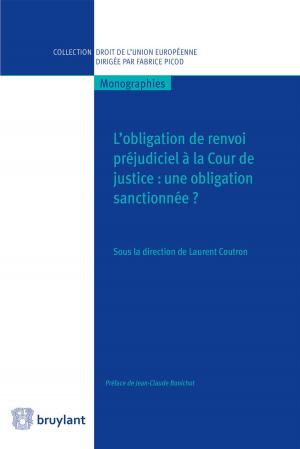Les noms de domaine .be/ .be domeinnamen
10 ans d'exist. du règlement pr la résolution ds litiges/10 jaar bestaan van het reglemnt ter beslechting
Nonfiction, Reference & Language, Law, Arbitration, Negotiation, & Mediation, Intellectual Property, International| Author: | Olivia De Prelle, Benjamin Docquir, Michel Flamée | ISBN: | 9782802741602 |
| Publisher: | Bruylant | Publication: | February 19, 2013 |
| Imprint: | Bruylant | Language: | French |
| Author: | Olivia De Prelle, Benjamin Docquir, Michel Flamée |
| ISBN: | 9782802741602 |
| Publisher: | Bruylant |
| Publication: | February 19, 2013 |
| Imprint: | Bruylant |
| Language: | French |
On 7 December 2000, the newly created non-profit organization DNS. be adopted the Terms and conditions for domain name registrations under the “.be” domain. These terms and conditions revolutionized the registration of “.be” domain names. The “.be” domain evolved from a small, closed domain, where domain names were reserved for organizations and undertakings showing that the requested domain name corresponded to their name or trademark, to a modern, open domain that applies the “First come, first served” rule as one of its key principles. This choice to liberalize the “.be” domain paid off extremely well. As expected, the liberalization also brought with it some cases of cyber squatting. The experience in the generic Top Level Domains or gTLD’s, like the “.com” or “.net” domains, showed that more freedom is used by some (a small minority) to infringe upon the intellectual property rights of others. DNS.be was well aware of this risk and with the liberalization, it introduced in its terms and conditions a Dispute Resolution Policy. Pursuant to this policy, the registrant of a “.be” domain name agrees that his domain name will be transferred to a third party (the complainant) if that party asserts and proves that: CEPANI, the Belgian Centre for Mediation and Arbitration, is proud that it has been, from the very beginning, the accredited Dispute Resolution Entity for the “.be” domain name disputes. Aided by a working group of experts, CEPANI set up the Rules that govern the proceedings to solve domain name disputes. From January 2001 until September 2012, more than 283 cases have been introduced with CEPANI. Because the online world is changing rapidly, also the terms and conditions of DNS.be and the Rules of CEPANI are amended regularly. After more than 10 years of dispute resolution regarding “.be” domain names, CEPANI thought that the time has come to reflect about what has been and about what has yet to come. CEPANI asked a few eminent authors to share their experience and their ideas, and is proud to publish their contributions in this book. Cet ouvrage est bilingue (Français/Neerlandais).
On 7 December 2000, the newly created non-profit organization DNS. be adopted the Terms and conditions for domain name registrations under the “.be” domain. These terms and conditions revolutionized the registration of “.be” domain names. The “.be” domain evolved from a small, closed domain, where domain names were reserved for organizations and undertakings showing that the requested domain name corresponded to their name or trademark, to a modern, open domain that applies the “First come, first served” rule as one of its key principles. This choice to liberalize the “.be” domain paid off extremely well. As expected, the liberalization also brought with it some cases of cyber squatting. The experience in the generic Top Level Domains or gTLD’s, like the “.com” or “.net” domains, showed that more freedom is used by some (a small minority) to infringe upon the intellectual property rights of others. DNS.be was well aware of this risk and with the liberalization, it introduced in its terms and conditions a Dispute Resolution Policy. Pursuant to this policy, the registrant of a “.be” domain name agrees that his domain name will be transferred to a third party (the complainant) if that party asserts and proves that: CEPANI, the Belgian Centre for Mediation and Arbitration, is proud that it has been, from the very beginning, the accredited Dispute Resolution Entity for the “.be” domain name disputes. Aided by a working group of experts, CEPANI set up the Rules that govern the proceedings to solve domain name disputes. From January 2001 until September 2012, more than 283 cases have been introduced with CEPANI. Because the online world is changing rapidly, also the terms and conditions of DNS.be and the Rules of CEPANI are amended regularly. After more than 10 years of dispute resolution regarding “.be” domain names, CEPANI thought that the time has come to reflect about what has been and about what has yet to come. CEPANI asked a few eminent authors to share their experience and their ideas, and is proud to publish their contributions in this book. Cet ouvrage est bilingue (Français/Neerlandais).















